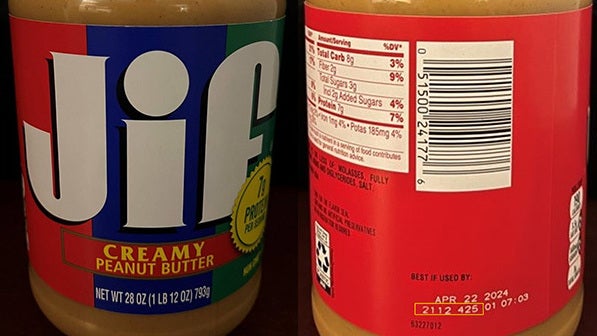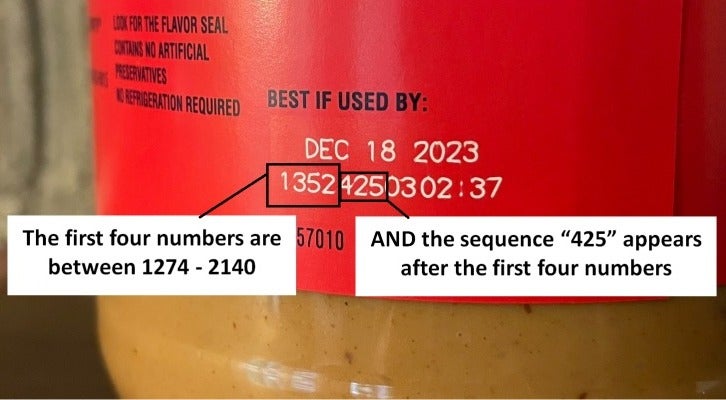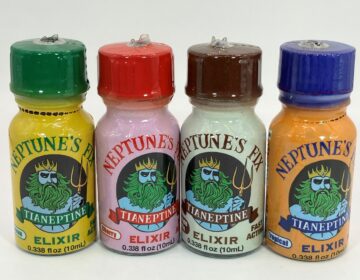The Jif peanut butter recall is pulling a cascade of other products from store shelves

All of the affected Jif peanut butter products can be identified by their lot code numbers, which is usually found near the ''best by'' date. (CDC)
The Jif peanut butter recall has rapidly expanded in the past week and it now affects at least 69 other products. The cascading effect is due to the many companies who use the peanut butter in their own chocolates, peanut butter sandwiches and more.
J.M. Smucker Co., Jif’s parent company, issued the initial voluntary recall last week, after the Food and Drug Administration traced a salmonella outbreak to a manufacturing facility in Lexington, Ky.
Almost every day since, other companies have issued their own recall notices, after confirming that their products also were affected. They range from fruit or veggie snack packs that include individually wrapped Jif cups to confections made with Jif peanut butter, including fudge and store-brand pies.
The original recall covered 49 Jif products, from .75 ounce cups to twin packs of 40-ounce jars. But the widening recalls include a number of other well-known brands, including Del Monte’s PB& J sandwiches and some of Albertsons’ store-made snacks.
How to tell if you have a recalled product
All of the affected Jif peanut butter products can be identified by their lot code numbers, which is often found near the “best by” date (it’s different from the UPC number on the bar code). If the lot code’s first seven digits end with 425, that means it was made in Lexington. If that same code also starts with four numbers between 1274 and 2140, you should not eat or serve the peanut butter, and it should be discarded.

Smucker is promising to reimburse people who have to throw away their peanut butter. Because of intense interest in the Jif recall, it has created a special web page to let people submit a claim for up to five products at a time. It plans to send coupons to pay for a replacement item, but that process could take as long as six weeks.
The recall goes beyond U.S. borders
The companies and brands issuing Jif-related recalls include Wawa, Country Fresh, the Coblentz Chocolate Company, and Walmart and Fudgeamentals. While some products reached shelves in only a handful of states, many of them were distributed nationwide.
The recall also goes beyond U.S. borders. Based on information Smucker provided on Monday, the products in its Jif recall were also sent to around 10 countries, from Canada and the Dominican Republic to Thailand and Japan, according to the FDA. It’s investigating the outbreak along with the Centers for Disease Control and Prevention other agencies.
So far, reports of illness are limited
The first person in the outbreak fell ill on Feb. 17. In all, the FDA and CDC say, 14 people have gotten sick from the salmonella outbreak, spanning 12 states. Those figures haven’t changed since the Jif recall was announced, but the CDC warns that “the true number of sick people in an outbreak is also likely much higher than the number reported,” because many people recover without medical help.
The CDC also notes that there’s normally a 2-4 week delay in determining if someone is part of an outbreak, meaning more recent cases simply might not have made it onto investigators’ radar yet.
What’s salmonella?
Salmonella is a type of bacteria. When it infects people, it causes an illness called salmonellosis, with symptoms including diarrhea, nausea, fever and stomach cramps. The illness can be more severe for children under 5 and for elderly or vulnerable adults, sometimes requiring treatment or hospitalization.
The symptoms’ onset and duration vary widely, but most people first experience them between six hours and six days after being infected, the CDC says. The illness then normally lasts up to a week.
And if you’re wondering: the salmonella name has nothing to do with fish. It’s named for Dr. Daniel E. Salmon, who devoted his career to studying infectious diseases in animals and people, after receiving the first doctorate in veterinary medicine awarded in the U.S. in 1876.
9(MDAzMzI1ODY3MDEyMzkzOTE3NjIxNDg3MQ001))



